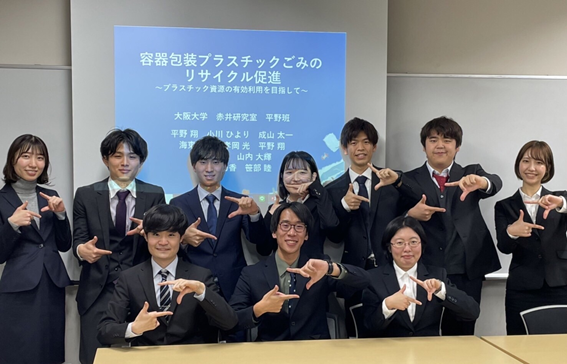
OSSIP Student Group Receives First-place Award in WEST Thesis Competition
The WEST (We Evolve Students' Tomorrow) Thesis Competition was held online over two days starting on Saturday, November 27, 2021. Students living in western Japan made presentations about their policy proposals.
Of the 104 theses by 479 students that entered this thesis competition, the thesis entitled “Promotion of Recycling of Plastic Packaging Waste,” written by Hirano Group, a student group of Professor AKAI Nobuo of the Osaka School of International Public Policy (OSIPP) received the First-Place Award, Present Data Analysis Award, and Policy Proposal Award.
Their research paper is posted on the WEST Thesis Library: https://west-univ.com/library/2021/01_01_west2021.pdf
This group’s paper relates to SDG 12 “Ensure Sustainable Consumption and Production Patterns” and deals with achieving a sustainable society through plastic resources cycling.
*The Sustainable Development Goals (SDGs) were adopted by the United Nations in 2015 as a universal call to action to end poverty, protect the planet, and ensure that by 2030 all people enjoy peace and prosperity.
Focusing on recycling of plastic packaging waste, namely making products from plastic waste, the students picked up two problems: recycling does not make money and poor cooperation in waste segregation by residents.
They analyzed reasons why recycling does not make money and examined the effects of political measures for solving the negative factors.
Based on the results of their analysis, the students made two proposals: imposing taxes on new plastic materials and the promotion of charging for garbage bags.
This group was awarded for their good understanding of complicated recycling systems, the integrity between their analysis of the present situation and policy proposals, and their persuasive and approachable writing.
The students gained a deep understanding of recycling systems in Japan and cultivated their logical thinking power through writing their thesis.
Writing up this thesis with an awareness of problems and creating bonds among students in different years through group activity became a precious experience for them.

Professor Akai and Hirano Group members